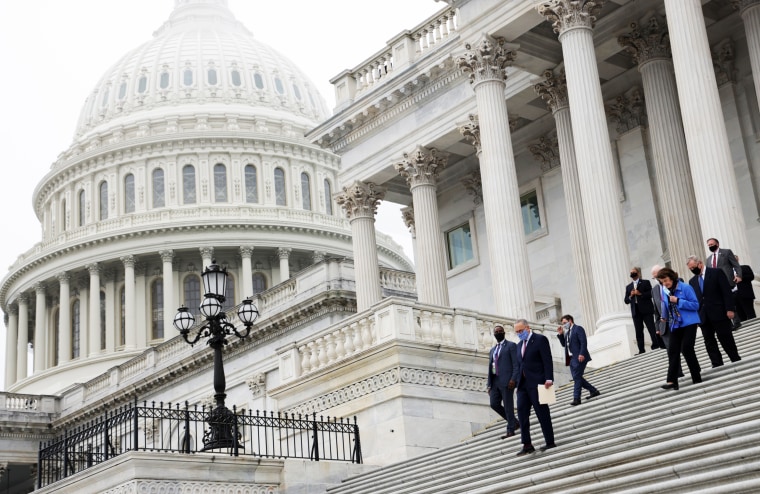The 2022 midterm elections are still more than 20 months away, so it seems awfully early for the National Republican Senatorial Committee to launch a seven-figure ad campaign. But the NRSC did exactly that last week, making an expensive ad buy for an unexpected reason.
The committee, which exists to elect Republican Senate candidates, launched ads specifically in the hopes of making the Democrats' "For the People Act" less popular.
The Republicans' ad campaign is emblematic of a larger truth: the Democratic legislation, intended to strengthen voting rights and bolster the nation's democracy, poses a political challenge for the right because it's made up of provisions the American mainstream is bound to support.
Indeed, there's no need to speculate about such attitudes. As Rachel noted on last night's show, The New Yorker's Jane Mayer published a striking report yesterday on the details of a private conference call held a couple of months ago, which helped capture the conservative agita about the range of the Democratic ideas' popularity.
A recording obtained by The New Yorker of a private conference call on January 8th, between a policy adviser to Senator Mitch McConnell and the leaders of several prominent conservative groups -- including one run by the Koch brothers' network -- reveals the participants' worry that the proposed election reforms garner wide support not just from liberals but from conservative voters, too. The speakers on the call expressed alarm at the broad popularity of the bill's provision calling for more public disclosure about secret political donors.
The article quoted Kyle McKenzie, the research director for the Koch-run advocacy group Stand Together, who told fellow-conservatives and Republican congressional staffers on the call that when the public heard a "neutral description" of the Democrats' H.R.1/S.1, Americans were "generally supportive" of the plan.
He added, however, that "the most worrisome part" for the right is that conservative voters "were actually as supportive as the general public was when they read the neutral description." In fact, McKenzie warned, "there's a large, very large, chunk of conservatives who are supportive of these types of efforts."
As part of the briefing, the same researcher went on to encourage conservatives not to even bother trying to "engage with the other side" on the argument that the legislation "stops billionaires from buying elections" -- because it's a fight the right is likely to lose.
McKenzie said, "Unfortunately, we've found that that is a winning message, for both the general public and also conservatives." He said that when his group tested "tons of other" arguments in support of the bill, the one condemning billionaires buying elections was the most persuasive -- people "found that to be most convincing, and it riled them up the most."
In terms of legislative strategies against the "For the People Act," McKenzie added that the Democratic proposals are so broadly popular that the right faced an uphill fight trying to turn Americans against it. The smarter move, he added, would be to rely on "under-the-dome-type strategies" -- tactics that focus on legislative obstruction on Capitol Hill, rather than public pressure.
At first blush, this may seem like great news for Democrats and others who support fundamental democracy reforms. After all, if conservatives' research is correct, half the battle has already been won: Americans, even on the right, support the core elements of the Democrats' top legislative priority.
But just below the surface, there are lingering problems: Sen. Joe Manchin (D-W.Va.) last week suggested he's prepared to reject the "For the People Act" because he wants reforms to be "bipartisan." Even if he were to come around, S.1 faces an inevitable Republican filibuster, and unless 50 Senate Dems are prepared to carve out an exception to the chamber's rules, the bill will almost certainly be killed, its broad popularity notwithstanding.
Watch this space.
